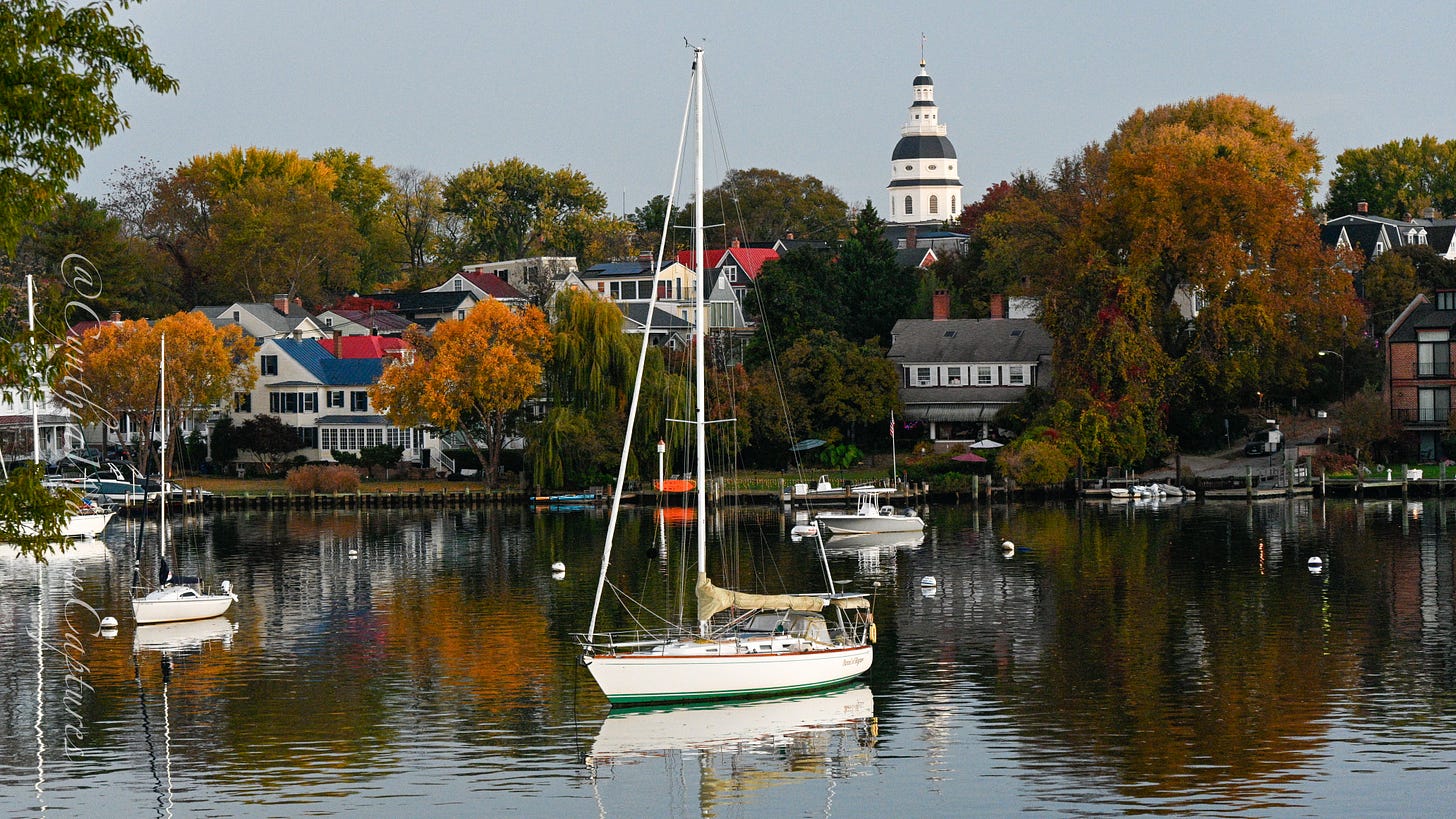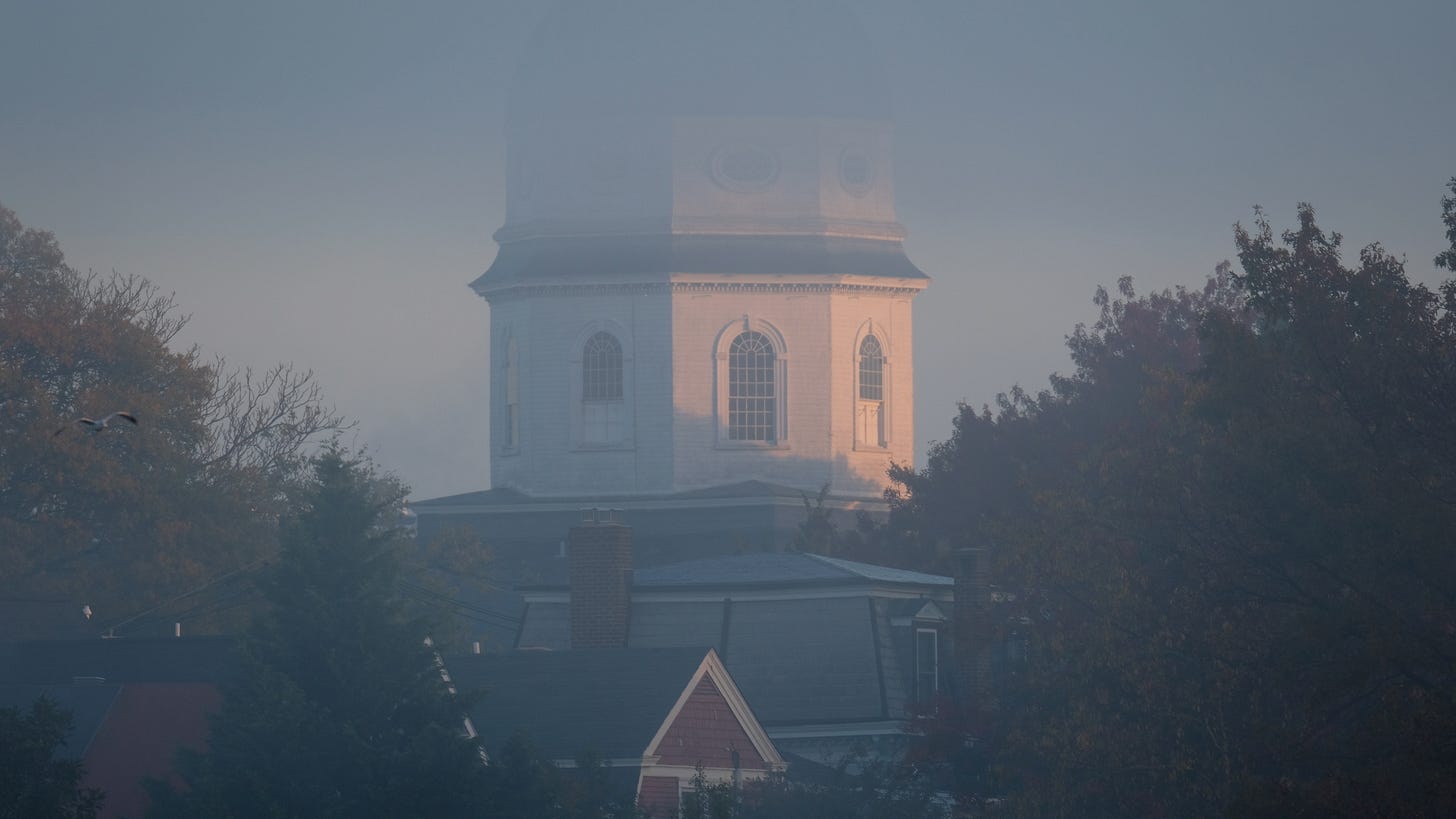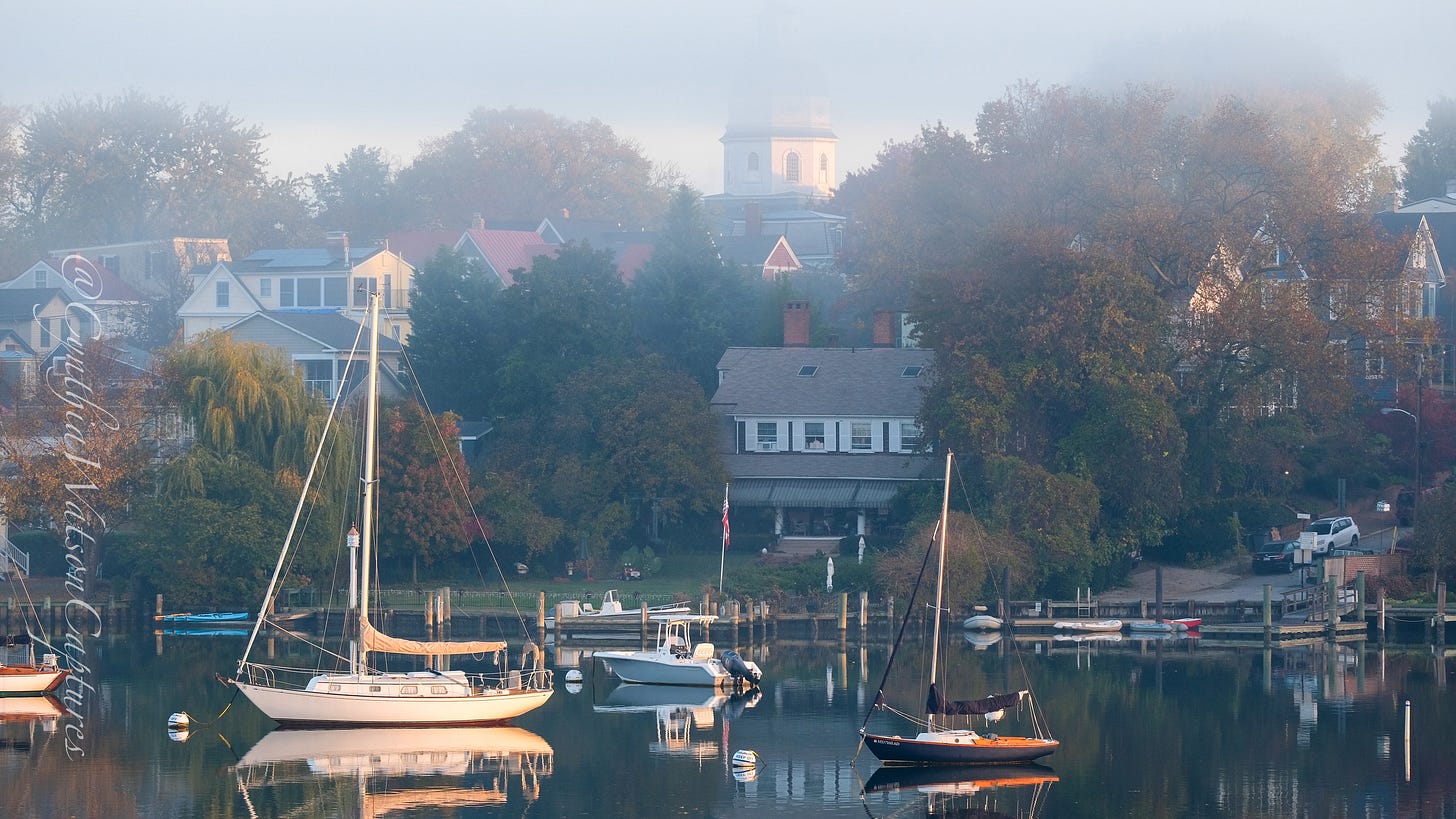The photograph encapsulates many glorious things about Annapolis, especially as Halloween colors remind us the calendar year is racing towards its conclusion. No, my husband and I don’t have a sailboat but thoroughly admire others own. No, we don’t live in the earliest portion of town established in 1649 as Eastport, on the south side of Spa Creek, only began as a town fifteen years later but I enjoy watching the Annapolis vista.
What excites me about this view is that white domed building. Oblivious as so many of our fellow citizens are of the nation’s history, too few recognize Annapolis’s role in the earliest years of our country. It thrills me each and every time I look at that building, just as it does to cast a vote, because of the dream this country offers, much of it crafted here.
The Maryland State House is the oldest continuously used capital structure in these fifty United States, functioning for 252 years as working location for the Governor and Lieutenant Governor as well as the General Assembly.
In that building, the War for Independence formally ended because Annapolis was the site for the newly independent capital for the United States between 1783 and 1784 where the Treaty of Paris, negotiated between George III’s government and the recently victorious colonies, underwent ratification in this location in January of 1784.
George Washington and the generation who created the laws for governing these United States walked the streets of late Eighteen Century Annapolis. Washington from roughly 50 miles away in northern Virginia personified in so many ways the benevolent and good we expect in our political figures to do because of the choices he made while Annapolis was the seat of power.
Please do not think I am merely a bleary-eyed wannabe professional historian of the Independence era, unaware that George and Martha owned slaves along with Thomas Jefferson, James Madison and most southern Founders. Or that I forget that even Massachusetts and several northern states had slaveowners in the past. Or that Europeans wiped out generations of indigenous peoples. And on and on. No one, not a single one of them (or us), is without something imperfect. The Founders wrote a Constitution that made laws restricting slaves be the status of 3/5ths of a human being while writing women out of the system altogether; both of those were horrible decisions with long-term consequences but we reversed them as a nation of laws administered by men and women elected by you and me the public.
We the people empowered the Founders as our representatives; we could have fought them but they were there in our stead, as nascent as our system was at the time. We have always had a role in this process, even when such a high percentage of us relinquish it through naïveté, ignorance, or boredom. But, it’s our system in our nation that arose out of that State capital for two years in our early history.
But these Founding individuals sought to mold this country into something unique. We haven’t always accomplished precisely what we think the Founding Generations aspired to (excuse me but they have been dead for two centuries: NO ONE knows precisely what individual thoughts were but we operate off the aggregate evidence of their intentions) but we have certainly crafted a union of some note over the past two and a half centuries.
In the shadow of that State House building, George Washington surrendered his commission as commander of the Continental Army, thus putting down the initial marker to support a free and open transfer of power to prevent the repeat of a life-long monarchy the colonies fought to depart. Character mattered.
Those who met in that Maryland State House probably recognized the appeal of inertia by maintaining the failing Articles of Confederation. Without significant revision, that flawed document would have sunk this grand experiment through bickering, competition, and the distrust so the men in that building pushed for a Constitutional Convention in Philadelphia in 1787. They didn’t necessarily expect a wholesale revision but that is what they produced after hard work. Character mattered before we hammered out a new framework by urging us to confront this tough issue, during the negotiating process as delegates wrestled with several issues requiring profoundly painful compromises, and after it was ratified as we set about to implement what this intricate Constitution of 1787 says; character still matters on the Constitution today.
I, for one, can never countenance my countrywomen or men surrendering governance to officials at any federal or state level, especially for the extended future. Instead, I passionately believe we entrust governance for a fixed term, depending on the relevant office, to those sworn to uphold the Constitution after they earn election by the people. Character matters here: both ours and the character of those to whom we entrust.
So, as I gazed at and photographs I have taken of this magnificent memorial to this country’s early years and its continuing promise, I remember day in and day out that character matters in America. I wonder whether others believe that as well?
This is the same State House four years ago on the morning of 9 November.
Thank you for reading Actions today and any other day. Thank you for your time, your thoughts which I genuinely seek, and your suggestions. I appreciate those of you who read this occasionally, daily, or go so far as to support it as a subscriber.
Be well, vote, and be safe. FIN







You just succinctly captured the sum total of all four years of my living and learning while attending the little trade school on the banks of the Severn: "character matters".
Some things don't change.
We LOVE Annapolis and it was our go-to get-away spot for the years we lived in S. Maryland for all the reasons you cited. The history alone makes it a beacon for those (like me) who get caught up in the nostalgia of walking the same streets as some of our Nation's founding fathers. And I'm sure that they were muttering the same frustrations back then: "Parking is impossible here..."
Your words: "...urging us to confront this tough issue, during the negotiating process as delegates wrestled with several issues requiring profoundly painful compromises" are illustrative of our lack of bi-partisan compromise today. Can you just imagine if, for some reason, our current Government body were confronted with a situation that required them to work together in creating a lasting document which would be relied upon to govern and define our lives and liberties 200 years into the future? The level of "painful compromises" our forefathers experienced would pale in comparison to the chaos that would ensue in current day efforts. I fear we'd all be swept up by whatever causal event required such an attempt and would never live to see any shred of success.